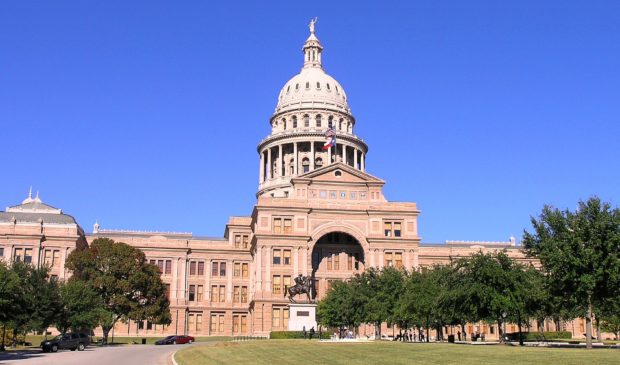Linkage fees challenged at legislature
Tuesday, April 11, 2017 by
Jo Clifton Just as Austin is beginning to study the idea of adopting linkage fees – fees on new construction levied for the purpose of raising funds for affordable housing – the Texas Legislature could be poised to close off that avenue.
State Rep. Ron Simmons (R-Carrollton) authored House Bill 1449, which won unanimous approval from the House Ways and Means Committee last week. The bill is currently pending in the Calendars Committee, the body that decides which bills to send to the House floor and when.
Linkage fees are fees applied per square foot of new construction at the time a building is permitted. They have been legally justified (and named) based on the link between the low-wage jobs created by commercial development and a need for more affordable housing.
Simmons told the committee that he believes that linkage fees are a de facto tax. He pointed out to the committee that the amended version of the bill had language exempting density bonus fees such as those already in use in the city of Austin. The bill also exempts any agreement already in place.
Linkage fees are used in Seattle, Denver and a number of cities in California, but not in Texas. It was clear that Simmons wants to make sure that Texas does not go the way of California on this issue.
When the bill was heard in committee last month, eight people, mostly representing the development and homebuilder community, indicated their support of the bill and their opposition to linkage fees. Three people, including Ed Wendler, Jr., spoke against the legislation.
Wendler, who said he was representing a group of investors who invest in rental housing, took credit for the city of Austin’s interest in linkage fees.
Wendler said he was representing the largest apartment builders in the state and that those builders would much prefer to pay “a reasonable linkage fee and be done with it,” rather than worry about providing years of affordable housing under some other program.
He said, “We are being pragmatic … and prefer the option that has the least impact on the businesses.”
Mayor Pro Tem Kathie Tovo confirmed that Wendler was one of the people who talked to City Council behind the scenes in favor of linkage fees. She said she was hopeful that the legislature would not take away a tool that Austin has yet to fully evaluate that might help the city generate more affordable housing.
Mayor Steve Adler, who has made comments that seem to favor use of linkage fees, declined to comment for this story.
In addition to Wendler, the committee heard from Scott Norman with the Texas Association of Builders, Gerry Poe (who is with KB Home but told the Austin Monitor he was representing the Home Builders Association of Greater Austin), Houston developer Mike Dishberger and several other supporters of the legislation.
Charlie Duncan of the Texas Low Income Housing Information Service warned the committee that under President Donald Trump the state would be losing millions of dollars in money for affordable housing and he urged it not to approve the legislation that would prevent the city from using a new tool. “The need for affordable housing doesn’t go away if we don’t fund it,” he said.
On Monday, Ned Muñoz, general counsel for the Texas Association of Builders, said that his group supports the legislation because it “protects housing affordability by preventing cities from adopting fees on all new housing and construction.” He pointed out that at $2 a square foot, which is the amount the city has discussed, the price of a 2,500-square-foot home would increase by $5,000.
“That would price out thousands of Texans if you were to look at it on a statewide level,” he said. According to Muñoz, it was publicity surrounding Austin’s consideration of linkage fees last year that brought the matter to the attention of the builders group.
Muñoz added, “We certainly appreciate the need for affordable housing but there are many things a city can do in place of linkage fees if they want to” address affordable housing. He suggested that the city exempt projects from city mandates, such as tree preservation, exempt affordable housing from fees and loosen zoning restrictions, and maximize the use of vacant city property. He also mentioned the use of general obligation bonds, more money from the general fund and land trusts.
The city of Austin has used most of those tactics, but exempting any developer from the tree ordinance would mean a war with environmentalists and loosening zoning restrictions would mean a war with neighborhood advocates.
Although some committee members had questions about preempting a city’s authority to enact its own legislation, several members seemed more concerned with cities that over-regulate developers.
Even Democratic Rep. Yvonne Davis of Dallas indicated she would support the legislation, noting that affordable housing is a statewide problem that the state should work to solve.
Photo by Daniel Mayer (Own work) [GFDL, CC-BY-SA-3.0 or CC BY-SA 2.5-2.0-1.0], via Wikimedia Commons.
The Austin Monitor’s work is made possible by donations from the community. Though our reporting covers donors from time to time, we are careful to keep business and editorial efforts separate while maintaining transparency. A complete list of donors is available here, and our code of ethics is explained here.
You're a community leader
And we’re honored you look to us for serious, in-depth news. You know a strong community needs local and dedicated watchdog reporting. We’re here for you and that won’t change. Now will you take the powerful next step and support our nonprofit news organization?









